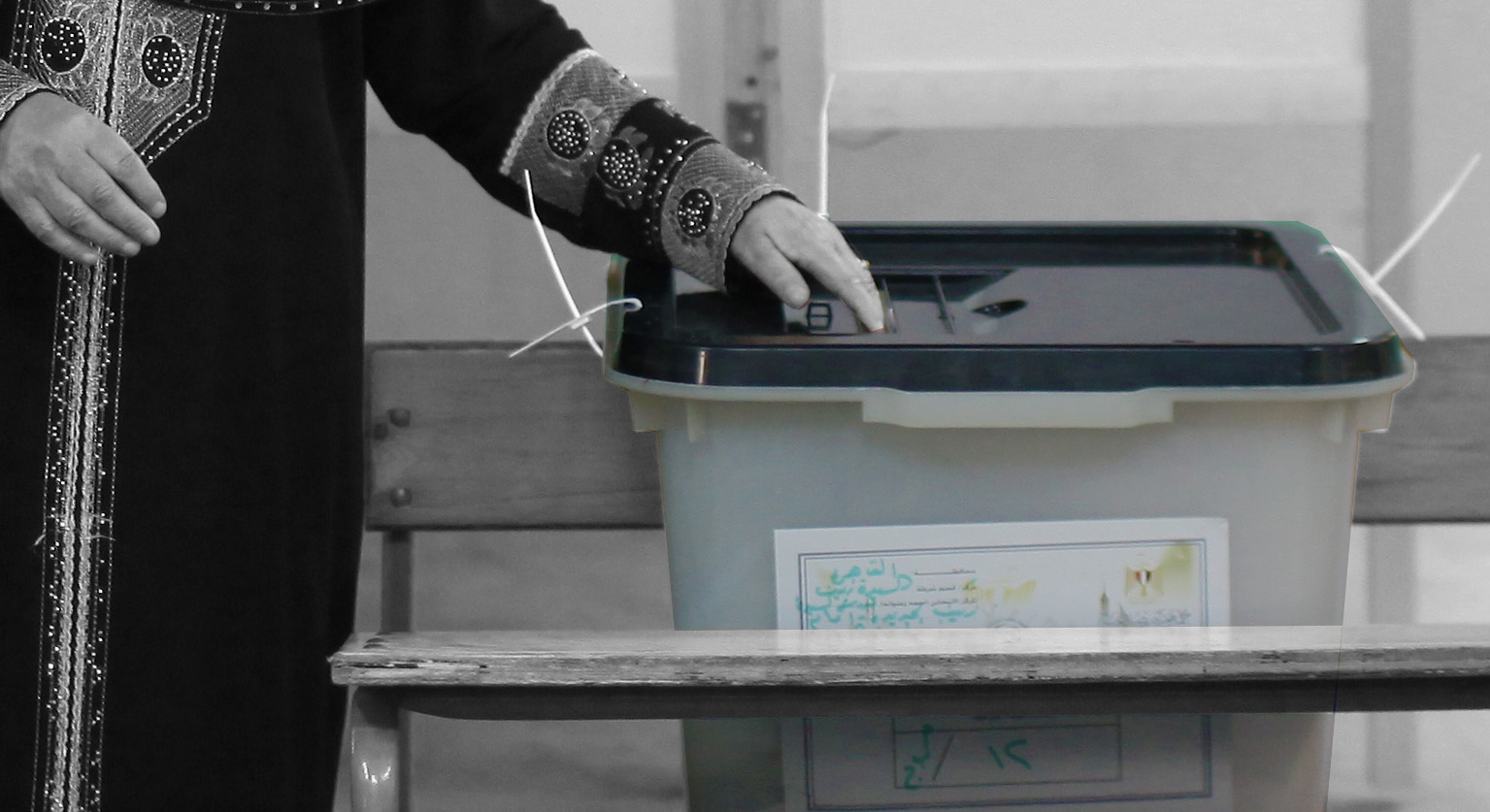
Organizing the Collection of Endorsement Signatures for the 2024 Egyptian Presidential Elections: An Example of Limiting Freedoms – Khaled Al Ali
Organizing the Collection of Endorsement Signatures for the 2024 Egyptian Presidential Elections: An Example of Limiting Freedoms – Khaled Al Ali
The entity which can be held fully responsible for all that happened during the collection of endorsement signatures in the 2024 presidential elections. It is the National Elections Authority, which not only did not stop the violations, ignored their documentation, and denied their existence, but also because its organization of this stage of elections was terrible.
According to Article 142 of the Constitution of the Arab Republic of Egypt amended in 2019, "to be accepted as a candidate for the presidency, candidates must receive the recommendation of at least 20 elected members of the House of Representatives, or endorsements from at least 25,000 citizens who have the right to vote, in at least 15 governorates, with a minimum of 1,000 endorsements from each governorate."
Article 2 of Decision 22 of 2014, approving the law regulating presidential elections says:
"To be accepted as candidates for the presidency of the republic, candidates must be endorsed by at least twenty members of the House of Representatives or must be supported by no less than twenty-five thousand citizens who have the right to vote in at least fifteen governorates, with a minimum of one thousand supporters from each governorate."
The National Elections Commission (formerly the Presidential Elections Commission) organized the process of citizen endorsement for those wishing to run for the presidency in the worst possible manner that Egypt had not witnessed in any previous presidential elections.
Resolution No. 7 of 2014 regulated the 2014 presidential elections, resolution No. 5 of 2018 regulated the 2018 presidential elections, and resolution No. 7 of 2024 regulated the 2024 presidential elections. Comparing these regulations in the three elections, the following can be deduced.
First, the period specified for documenting citizens’ endorsement for those wishing to run was almost identical.
- In 2014, it was from 3/31/2014 to 4/20/2014 = 21 days
- In 2018, it was from 1/8/2018 to 1/29/2018 = 22 days
- In 2023, it was from 9/25/2023 to 10/14/2023 = 20 days
It becomes clear that elections had the shortest period for collecting endorsements.
Second, the number of documentation offices affiliated with the Registry Authority designated to document citizens’ support for those wishing to run, was as follows:
- In 2014, the number was 350 documentation offices
- In 2018, the number was 390 documentation offices
- In 2024, the number was reduced to 217 documentation offices, under National Elections Authority Resolution No. 8 of 2023 dated 9/25/2023.
Nevertheless, there were 572 notarization offices affiliated with the Registry Authority linked to the unified information network of the Real Estate Registry and Authentication Authority as of November 223 (attached is the statement of the Ministry of Justice regarding the number of notarization offices at the republic level).
Third, the average time for issuing citizen endorsements of those planning candidacy was the following:
In 2014, According to Presidential Elections Commission Resolution No. 18 of 2014, the number of supporters for candidate Abdel Fattah El-Sisi reached 188,930 and those for candidate Hamdeen Sabahi reached 31,555. This was at the end of the 21-day period for documenting citizens’ support, so the total number of supporters for both candidates is 188,930 + 31,555 = 220,48.
By dividing the total number of supporters by the documentation offices in 2014, which amounted to 350 offices, and the number of days in the documentation period, which was 21 days (220,485 / 350 notarization offices = 630 / 21 days) we get 30 notarizations per day in one office on average.
In 2018, at the end of the endorsement period on January 29, 2018, Counselor Mahmoud Al-Sharif, the official spokesman for the National Elections Authority, announced that the total number of citizen endorsements in the documentation offices in the Real Estate Registry reached 1,134,000 for 29 of those wishing to run.
Moreover, Dr. Muhammad Bahaa El-Din Abu Shaqa, the official spokesman for candidate Abdel Fattah al-Sisi's electoral campaign stated that they collected more than 900,000 endorsements, but the campaign only submitted 161,707 of them in accordance with National Elections Authority Resolution No. 33 of 2018, and that was at the end of the endorsement period, which lasted 22 days.
By dividing the total number of supporters by the documentation offices in 2018, which amounted to 390 offices, and the number of days in the documentation period, which was 21 days (1,134,000 / 390 notarization offices = 2,907 / 22 days) we get 132 notarizations per day per office on average.
In 2023, according to National Elections Authority Resolution No. 24 of 2023, the number of supporters for candidate Abdel Fattah al-Sisi reached 1,130,105, and those supporting Hazem Omar were 68,071. Candidate al-Sisi's agent submitted the nomination papers on Saturday, October 7, 2023, 11 days after The beginning of the period for documenting citizen endorsements. On the other hand, Candidate Hazem Omar's agent submitted the nomination papers on Friday, October 13, 2023, 17 days after the beginning of the period for documenting citizens’ support. Thus, the total number of supporters for both candidates was 1,130,105 + 68,071 = 1,198,176.
By dividing the total number of supporters of candidate Abdel Fattah al-Sisi by the documentation offices in 2023, which amounted to 217 offices, and the number of days the campaign took to collect citizens’ support, which amounted to 11 days (1,130,105 / 217 notarization offices = 5,208 / 11 days) we get 473.5 notarizations per day in one office on average.
By dividing the total number of supporters of candidate Hazem Omar by the documentation offices in 2023, which amounted to 217 offices, and the number of days that the campaign took to collect citizens’ support, which amounted to 17 days (68,071 / 217 notarization offices = 313 / 17 days) we get 18.5 notarizations per day in one office on average.
That is, in the first 11 days of documentation, the average number of endorsements issued by the notarization offices affiliated with the Real Estate Registry was 473.5 endorsements for candidate al-Sisi + 18.5 endorsements for candidate Hazem Omar, a total of 492 endorsements on average in each of the 217 certification offices.
Fourth, the average time for extracting one endorsement per citizen can be calculated as follows. The official working hours set by the Ministry of Justice for the notarization offices affiliated with the Real Estate Registry Authority to receive endorsement for applicants wishing to run for the position of President of the Republic were 7 hours a day (from nine in the morning until four in the evening) throughout the week, including Fridays. The following is the calculation of the average support extraction for the three presidential elections in question:
- In 2014: 7 work hours per day, i.e. 420 minutes. Divided by 30 endorsements (average number of endorsements in one office per day), it took 14 minutes to extract one endorsement.
- In 2018: 420 minutes / 132 approvals (average number of approvals in one office per day) = 3.18 minutes to extract one endorsement.
- In 2023: 420 minutes / 492 approvals (average number of approvals in one office per day during the first 11 days of the approvals documentation period) = 0.85 minutes, or 51 seconds, to extract one endorsement.
Taking into account the schedules for reducing electricity loads issued by the Council of Ministers on 7/31/2023, which remained in effect during the period of documenting citizens’ support for those wishing to run, loads were reduced in half of Cairo Governorate, for example (the highest population density in the Republic) for one hour between twelve noon and four o’clock in the evening in the various neighborhoods of the governorate. That is, half of the notary offices in Cairo Governorate were working 6 hours a day instead of 7 hours, and by recalculating the average to 6 hours (360 minutes), we get 360 minutes / 492 approvals (average number of approvals in one office per day during the first 11 days of the approvals documentation period) = 0.73 minutes, or 44 seconds, to extract one approval.
The procedures issued by the National Elections Authority regarding documenting citizens’ support for those wishing to run, per Resolution No. 7 of 2023, are as follows:
- Presenting to one of the notarization offices of the Land Registry and Notarization Authority or the headquarters of diplomatic missions.
- The person responsible for verifying the signature must verify the citizen’s identity based on the data of the national ID or a valid passport
- The endorser's name, place of residence, the governorate in which it is located, and the national ID card number are confirmed.
- Signature verifiers must verify what the endorser dictates regarding the name of those they wish to endorse.
- The citizen signs the form with his/her handwriting or thumbprint.
- The specialist must inform the endorsing citizen before starting procedures to verify signatures of the penalty for endorsing a candidate more than once or endorsing another candidate.
- The endorsement form is prepared in two copies, signed by supporting citizens, one of which is handed over to them and the other kept in the notarization office.
Based on the above, it is clearly impossible to implement all of these procedures in 51 seconds for one endorsement, let alone 44 seconds in approximately half the number of offices. If the reasonableness of this is accepted, it becomes clear that there is no time, not even a few seconds, to document the support of any other candidate. The National Elections Authority, through this organization that it put in place for the stage of collecting popular proxies, has caused all the aforementioned violations to occur.
Khaled Al Ali
Excerpt from Khaled Ali's statement in the Endorsement Collection Case.


